满文尽是_盖茨比_对_了不起的盖茨比_中主要人物性格对比分析
- 格式:pdf
- 大小:60.97 KB
- 文档页数:2
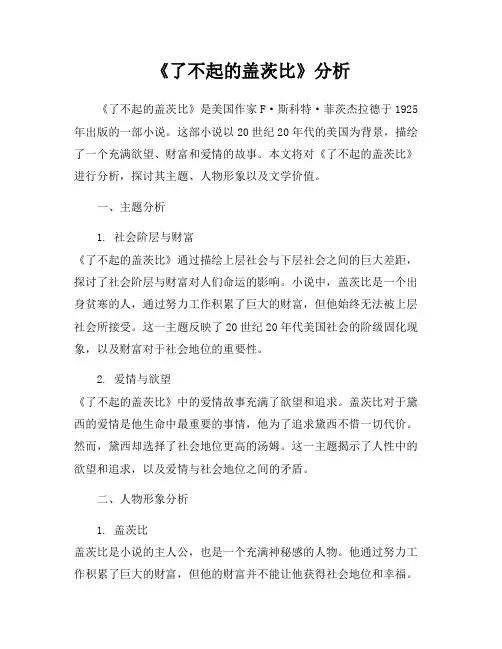
《了不起的盖茨比》分析《了不起的盖茨比》是美国作家F·斯科特·菲茨杰拉德于1925年出版的一部小说。
这部小说以20世纪20年代的美国为背景,描绘了一个充满欲望、财富和爱情的故事。
本文将对《了不起的盖茨比》进行分析,探讨其主题、人物形象以及文学价值。
一、主题分析1. 社会阶层与财富《了不起的盖茨比》通过描绘上层社会与下层社会之间的巨大差距,探讨了社会阶层与财富对人们命运的影响。
小说中,盖茨比是一个出身贫寒的人,通过努力工作积累了巨大的财富,但他始终无法被上层社会所接受。
这一主题反映了20世纪20年代美国社会的阶级固化现象,以及财富对于社会地位的重要性。
2. 爱情与欲望《了不起的盖茨比》中的爱情故事充满了欲望和追求。
盖茨比对于黛西的爱情是他生命中最重要的事情,他为了追求黛西不惜一切代价。
然而,黛西却选择了社会地位更高的汤姆。
这一主题揭示了人性中的欲望和追求,以及爱情与社会地位之间的矛盾。
二、人物形象分析1. 盖茨比盖茨比是小说的主人公,也是一个充满神秘感的人物。
他通过努力工作积累了巨大的财富,但他的财富并不能让他获得社会地位和幸福。
盖茨比对于黛西的爱情是他生命中最重要的事情,他为了追求黛西不惜一切代价。
盖茨比的形象反映了20世纪20年代美国社会中的追求和失落。
2. 黛西黛西是盖茨比的爱人,也是一个充满欲望和追求的人物。
她对于社会地位和财富有着极大的追求,最终选择了社会地位更高的汤姆。
黛西的形象揭示了20世纪20年代美国社会中女性的地位和追求。
3. 汤姆汤姆是黛西的丈夫,也是一个典型的上层社会人物。
他对于财富和社会地位有着强烈的追求,对于盖茨比的出现感到威胁。
汤姆的形象反映了20世纪20年代美国社会中上层社会人物的特点和价值观。
三、文学价值分析1. 描写细腻《了不起的盖茨比》通过细腻的描写,展现了20世纪20年代美国社会的繁荣与虚伪。
小说中的场景描写、人物描写以及情感描写都非常细腻,使读者能够深入感受到那个时代的氛围和人物的内心世界。
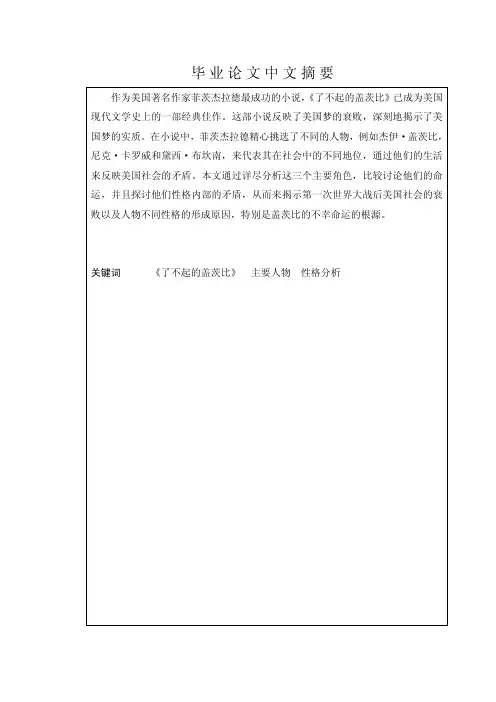
作为美国著名作家菲茨杰拉德最成功的小说,《了不起的盖茨比》已成为美国现代文学史上的一部经典佳作。
这部小说反映了美国梦的衰败,深刻地揭示了美国梦的实质。
在小说中,菲茨杰拉德精心挑选了不同的人物,例如杰伊·盖茨比,尼克·卡罗威和黛西·布坎南,来代表其在社会中的不同地位,通过他们的生活来反映美国社会的矛盾。
本文通过详尽分析这三个主要角色,比较讨论他们的命运,并且探讨他们性格内部的矛盾,从而来揭示第一次世界大战后美国社会的衰败以及人物不同性格的形成原因,特别是盖茨比的不幸命运的根源。
关键词 《了不起的盖茨比》主要人物 性格分析Title Analysis of the Personality of the Major Characters in The Great GatsbyAbstractThe Great Gatsby is the finest novel written by the famous American writer, Fitzgerald. It is considered by many to be one of the classics of modern American literature. The novel mirrors the decline of the American dream and deeply reveals the essence of it. In The Great Gatsby, Fitzgerald selects skillfully different people such as Jay Gatsby, Nick Carraway and Daisy Buchanan to represent their different statuses in society and eventually to reflect the contradictions of the American world by their lives. This essay will focus on the discussion of the three major characters, by analyzing the three major characters in detail, discussing their fate by comparison and talking about the internal conflict of their personality, to have a further understanding of the corruption of the American society after the First World War and the cause of their different personality especially the misery fate of Gatsby.Keywords The Great Gatsby major characters analysis of personality2006届英语专业毕业论文第 1 页共 1 页Contents1A Brief Introduction to The Great Gatsby (1)2Tragic Jay Gatsby (2)3 Vanity and Selfish Daisy Buchanan (4)4 Neutral Nick Carraway (6)Conclusion (8)Acknowledgements (9)References (10)1 A Brief Introduction to The Great GatsbyFrancis Scott Fitzgerald was considered as one of the most well known writers in America at an era that he named “the Jazz Age”. During the twenty years of his writing, he published about one hundred short stories and four long novels including This side of Paradise, The Beautiful and the Damned, Tender is the Night and The Great Gatsby. In addition, before he died, he left an uncompleted novel, The Last Tycoon. “His books have been considered by as many a symbol for the ‘Jazz Age,’ a time of extraordinary wealth and promise, but Fitzgerald’s novels are much more than that, presenting the truth behind the twenties and creating an atmosphere, which has earned a permanent place in American literature. Fitzgerald’s novels work on many different levels, giving us unforgettable characters and events on one, as well as referring to the problems of American wealth and spirituality on another.”(Millett, 2005) Written in 1925, The Great Gatsby is one of the greatest literary works of this period and one of the classics in American literature, which reveals the moral emptiness and hypocrisy under the prosperity of the Jazz Age. When the book was published, it became famous among the public, because the author criticizes the thought of extreme individualism in the contemporary American society. “This thought is like drugs in the society; poisonous and irresistible. It urges the growth of selfishness of human being.”(Wu Jianguo, 2002:188) Fitzgerald uses his pen to reveal the life and the ideas of people after the First World War and introduces one kind of valuable spirit. The American dream of happiness and individualism has fallen into the mere pursuit of wealth. Many experiences in Fitzgerald’s early life appear in this famous novel. It is proved to be the most successful and mature one of Fitzgerald's novels. In it, Fitzgerald presents the rise and fall of Jay Gatsby, skillfully choosing a first-person narrator, Nick Carraway’s perspective. The famous poet, T.S.Eliot points out that The Great Gatsby has been the first progress made in the American novel since Henry James.2 Tragic Jay GatsbyJay Gatsby, a typical upstart after the First World War, is a sensitive young man who idolizes wealth and luxury. He falls in love with Daisy, a beautiful and charming woman, when he stations at a military camp near her home, but later she marries another man. The protagonist orders his life around for the desire to be reunited with Daisy. His search for the American dream leads him from poverty to wealth, into the arms of his beloved and eventually, to his death. He is attracted by Daisy’s grace and charm, but blinds her shortcomings. Gatsby reveals himself to be an innocent hopeful young man who stakes everything on his dreams, without the realization that his dreams are unworthy. “He gives Daisy an idealistic perfection that she cannot possess in reality.”(Rubinstein, 1998:305) He takes it for granted that he would win Daisy back if he becomes rich. Therefore he “became rich through bootlegging and other criminal activities.”(Hu Yintong, 1995:369)) He holds his opulent parties weekly to draw Daisy’s attention. He tries his best to gain the favor of her by arranging such fabulous entertainment.To some extent, Gatsby is naive and stupid for he never sees Daisy in her true colors just as he never sees the green light clearly. Though he never stops loving and has taken the house in West Egg to be near her, he never realizes that he can’t come back to the old warm world. It is easy to find that throughout his courtship of Daisy, Gatsby is always in a position of less power and lower social status. Because Gatsby has idolized her, Daisy will necessarily not live up to his expectation. The reader may find out the contradiction in Gatsby’s personality after reading the novel. On one hand, Gatsby is innocent and naive in his heart for he sticks to his goal and dedicates himself to achieve his destination, but he never realizes that it is actually unreal. He shows his loyalty to his beloved and dares no effort to make his dream come into true. However, on the other hand, he owns money by all means including illegal ones and he is indifferent to the death of Myrtle Wilson, the superficial wife of a garage man called George Wilson. Just as the novel mentions, “he spoke as if Daisy’s reaction was the only thing that mattered.” (Fitzgerald, 2001: 192) Gatsby is nimble and ambitious in making money, which shows the “sagacity” of modern people, but towards love he gives us the impression of “a naive young man.”The reader may wonder what makes Gatsby great? Gatsby is great because of his loyalty to love. He has the desire to repeat the past, and the desire for money. For Gatsby, Daisy is the soul of his dreams. He believes he can regain Daisy. Although he has the wealth that can match with the leisured class, he does not have their manners. His tragedy lies in his possession of a naive sense. Nick, the novel’s narrator, considers that his greatness lies in the talent for self-invention, the ability to transform his dreams into reality, and his persistent love. His life is dedicated to the recovery and renewal of an early love with Daisy, whose “voice is full of money.”(Fitzgerald, 2001: 11) He believes in Daisy and manages to protect her. But he does not know Daisy has betrayed him when he wants to ensure the safety of her. Daisy has already forgotten him when he lies in the tomb lonely.To some degree, George Wilson is comparable to Gatsby for both of them are dreamers and both are ruined by their pure love for women. He commits suicide after shooting Gatsby dead, just as Marcus Cunliffe comments “ Gatsby is dead-killed by a demented creature that does not realize that the Buchanan’s are to blame for misfortunes”.(Cunliffe, 1998:29) To some degree, Gatsby is doomed to die. Tang Jianqing, the famous translator of The Great Gatsby, points out that “Gatsby’s heart will be broken even if the bewildered garage man does not murder him. He knows Daisy will not give him a call though he takes the risk to wait for Daisy’s phone.”(Tang Jianqing, 1998:4) It is true that Tom and Daisy not only destroy Gatsby but also spoil his belief and soul.Therefore, Gatsby’s tragedy does not lie in his death, but in the death of his dream of utopia. It is his lack of reason and judgment that leads him to death. When introducing the origination of Gatsby’s name, Fitzgerald writes: “The true was that Jay Gatsby of West Egg, Long Island, sprang from his platonic conception of himself. He was a Son of God–a phrase which, if it means anything, means just that and he must be about His Father’s business, the service of a vast, vulgar, and meretricious beauty”. (Fitzgerald, 2001:131) This sets the tone of Gatsby’s tragic life. He has not been aware of the different social statuses between his and Tom’s. In general, Jay Gatsby is one of the best among characters in the novel. Even though he is a bootlegger and all his money is illegally made he still has more conscience than many others. Gatsby wants people to be happy, and if they are happy he will be happy, too. He holds luxury parties for people to attend and enjoy themselves. He also does hisbest to make Nick feel easy in his garden. Gatsby shows a certain amount of kindness to almost everyone he meets. His parties are open to anyone who wants to attend no matter what his social class is. He does his best to be kind to almost everyone. From this aspect, he is a very decent person indeed.All in all, Gatsby is only a dreamiest in his whole life. His loyalty to his love and ideal and the contradictions of his dreams lead to the disillusionment of his American dream. His death, in a sense, serves as a warning, but it also ennobles him.3Vanity and Selfish Daisy BuchananAs a beautiful and charming girl in the upper class, Daisy is quiet active in all kinds of social activities and she once had her true love. In any way, Daisy is undeniably beautiful. In her first appearance, her face is depicted to be sad and lovely. It is safe to say Daisy once really loved Gatsby since she even “packing her bag one winter night to go to New York and say good-by to a soldier who was gong overseas.”(Fitzgerald, 2001:101) Her mother prevents her in time and after that she keeps quiet until the next autumn. To some extent, her mother not only prevents Daisy’s stupid idea but also changes her opinions about the real meaning of life. After that, Daisy becomes a representative of the upper class. At that time, the most important thing for a lady was to find a rich husband with decent status, so Daisy makes good use of her beauty to deal with a lot of young men. Her vanity is completely disclosed when she contacts with those men. She has bright eyes and a bright passionate mouth and her best feature seems to be her voice. It’s charming. Daisy knows how to use it, too. She always murmurs in low, fantastic way to get people to come closer and pay more attention to her. Proving her charm to men is everything in her life. Then she quickly gets rid of another man to marry Tom just because Tom is richer.After the marriage, Daisy is sardonic and somewhat cynical and behaves superficially to mask her pain at her husband’s constant infidelity. Tom has a shady affair with Myrtle Wilson, so she is not happy although she lives a comfortable life. However, she has to endure and pretend to know nothing about it because she knows that having a husband of high status is much more important than having a man’s love.Fitzgerald attempts to describe Daisy as being a little naive or foolish. Daisy even hopes that her daughter becomes a beautiful fool. She says, “I hope she’ll be a fool-that’s the best thing a girl can be in this world.”(Fitzgerald: 2001, 23) Daisy’s remark is somewhat sardonic: It seems that she criticizes the social values of her era, but she does not seem to challenge them. Instead, she describes her own satisfaction with life and seems to imply that a girl can have more fun if she is beautiful and simplistic. Daisy herself often acts in that way. She conforms to the social standard of American feminity in the 1920s, so she is the product of a social environment .To a great extent, women’s intelligence is not important at all. At Gatsby’s party, she focuses on the actress and the director, who are totally unaffiliated with reality. Daisy’s blind eye on reality is disclosed here.Compared with Gatsby, Daisy, Nick’s cousin and Gatsby’s lover, is superficial, shallow, and self-centered for she sees everything from the perspective of her own happiness. For Fitzgerald, women like Daisy represent the deepest seductive power of the American dream as well as its greatest dangers. Daisy’s lack of responsibility is revealed at the end of the story. When she drives over Myrtle and she doesn't even stop, which shows what Fitzgerald wants to reveal in the whole book—the rich have no concept of responsibility in reality. She is a little bit too careless. In fact, her carelessness leads to the death of Myrtle Wilson. She proves her real nature when she chooses Tom over Gatsby, and allows Gatsby to take the blame for killing Myrtle Wilson even though she herself is the murderer.Finally, Daisy and Tom move away rather than attend Gatsby’s funeral, leaving no address. Daisy is indifferent to the death of Gatsby. As a matter of fact, she is the real murderer of Myrtle Wilson. After the accident, she and Tom conspire together and follows her husband’s suggestion to let Gatsby take the responsibility.Why Daisy is unwilling to leave Tom and come together with Gatsby after he becomes rich? In fact, there are also some contradictions in her personality. On one hand, she is moved by Gatsby’s loyalty and stubbornness, which is fully embodied in the reunion between Gatsby and her. In addition, she is also attracted by Gatsby’s wealth and disappointed at Tom’s infidelity. On the Other hand, she dose not have the power to leave her husband and her family when Tom confronts Gatsby. She can’t lose the comfortable and luxury life with Tom. “This life is boring but gives her a feeling of safety.”(QianQing,1994:303) During the First World War, Gatsby is only an inferior officer. Therefore, though Daisy loves him, she is unwilling to marry him. After Gatsby leaves to fight in the war, she marries Buchanan, a young man from an aristocratic family who promises her a wealthy lifestyle. Gatsby gathers great fortune and becomes the new rich, but Daisy is married to Tom Buchanan who is the “the very rich” and the traditional aristocrat. Though Daisy is unsatisfied with Tom’s behavior and never forgets Gatsby, the wealth makes Daisy and him invulnerable. So in the end, Mr. Gatsby’s dream still has not come true and Daisy does not break up with Tom to go with Gatsby.As a representative lady of the upper class at the particular time, Daisy enjoys vanity, selfishness and sophistication that a young woman often has at her time. It’s her vanity and selfishness that cause the death of Gatsby.4 Neutral Nick CarrawayThere is a sharp contrast between Gatsby and Nick. Critics point out that the former is passionate and active, while the latter is sober and reflective. They seem to represent two sides of Fitzgerald’s personality. At the very beginning of the story, Nick is introduced directly, but Gatsby remains a distant and unknown character for a good while.Generally speaking, Nick is a conservative dreamer with independent character. He comes to the East from the Midwest to pursue a happier life like Gatsby but he is greatly affected by the traditional morals, so he has his own rules rather than lose himself among the dishonest people. “They are judged by how well they stand up to his own virtues.”(Opticalcrane, 2005) Just as he says at the beginning of the book, “I’m inclined to reserve all judgments.” (Fitzgerald, 2001:1) Nick represents the lower classes of the society who also strives for the American dream. In fact, he is not very sober at the beginning. He admires his wealthy neighbor and the opulent parties without the realization of the emptiness of the values beneath such luxury life. However, unlike Gatsby, he gradually becomes reflective and objective especially after he is adversely affected by the events of that summer-- the death of a woman he meets briefly and indirectly, who is having an affair with his cousin’s husband and whose death leads to the death of his next-door neighbor.After witnessing the tragedy of Gatsby, he wakes from his unreal dream in time and ends his romantic relationship with Jordan Baker peacefully. This is a turning point of his mind.Nick is the best narrator of the novel; Firstly, he is Daisy’s cousin and Gatsby’s neighbor, and secondly he is tolerant and open-minded so he can give objective comments on events and people. Even so, there is also a powerful conflict existing in his personality that he does not resolve until the end of the book. On one hand, Nick is attracted to the wealthy New York where life pace is fast. On the other hand, he finds that lifestyle grotesque and damaging. Such inner conflict is symbolized throughout the book by Nick’s romantic affair with Jordan Baker. He is attracted by her vivacity and sophistication just as he is repelled by her dishonesty and her lack of consideration for other people. Nick realizes that life in New York is a “quality of distortion”(Fitzgerald, 2001: 236) especially after he stages a small funeral for Gatsby. This life covers horrible moral emptiness that makes him lose his equilibrium, so he returns to Minnesota to look for a quieter life with more traditional moral values. This decision shows that Nick is more mature and sensible than Gatsby for he recognizes that such life does not belong to him. Nick is unlike the other characters of the book and he is not one of the careless people. He has a conscience, he is not selfish, and he has managed to stage a small funeral for Gatsby. His down to earth character shows how superficial Daisy and Tom are. Fitzgerald describes Nick Caraway to be an independent character with his own belief, not a narrator who represents the author’s voice.ConclusionTo sum up, The Great Gatsby is an elegy of the corruption of the American Dream .The novel clearly shows that there is no way from money to love, from material to spirit. The author criticizes the American society in 1920s. Fitzgerald uses the characters to show the destruction of morals in society. The characters in this novel, many of them lose their morals in order to find their ideal place in the society. They hold their beliefs for the hope of being acceptable. Myrtle believes she can change her true social class to be accepted by Tom’s; Jay Gatsby bases his whole life on buying love of Daisy with wealth. However, they all become the victims of their dreams. Fitzgerald also shows how many people in America during this time were confused and lived meaningless life. Nick, Gatsby and Daisy are all westerners. “The East is associated with the fast-paced lifestyle, decadent parties, crumbling moral values, and the pursuit of wealth, while the West and the Midwest are associated with more traditional moral values. In this moment, nick realizes for the first time that though his story is set on the East Coast, the western character of his acquaintances-‘some deficiency in common’ is the source of the story’s tensions and attitudes.”(Brian Phillips, 2003:120) To some extent, their different personalities are caused by their attitudes towards money. Nick keeps his own judgments and he neither attaches so much importance to love as Gatsby nor money as Daisy. That is why he can deal with the relationship properly with Jordan Baker. Gatsby puts love in the first position and making money is just a means to get Daisy’s love. While Daisy loves money and the luxury life more than Gatsby so she marries money. What she wants is the comfortable life so she has to forebear Tom’s fault. In fact, Gatsby and Daisy are destroyed by the decayed social and moral values of the society. Therefore, it is not only the tragedy of love between Daisy and Gatsby but also the tragedy of the American dream.AcknowledgementsThanks everyone for giving me the help to complete my essay, especially my tutor Wu Lianghong, who has given many valuable suggestions and shows great patience to revise my essay. I highly appreciate her seriousness towards my work.Moreover, I am grateful to my classmates who provide me some necessary information. It is their help that encourages me to overcome any difficulties I met in the passed three months.References[1]Cunliffe, Marcus. 美国的文学[M]. 北京:中国对外翻译出版公司, 1998.[2] Fitzgerald, Scott Francis. The Great Gatsby[M]. 青岛:青岛出版社, 2001.[3] Millett, Frederick.C. Analysis: theGreatGatsby[M/CD]. Millettf [June2005]March.2006.</~millettf/gatsby.html>[4] Opticalcrane. Nick-Analysis of Major Characters[M/CD]. Essay [August 4, 2005]23May. 2006 </essay.php? t=27006>[5] Phillips, Brian. Study guide to The Great Gatsby[R]. 天津:天津科技翻译出版公司,2003.[6]Rubinstein, Annette T.美国文学源流[M]. 北京:外语教育与研究出版社, 1998.[7]胡荫桐、刘树森. 美国文学教程[M].天津:南开大学出版社, 1995 .[8] 钱青. 美国文学名著精选[M]. 北京:商务印书馆,1994.[9] 唐建清, 巫宁坤. 了不起的盖茨比[M].南京:译林出版社, 1998.[10] 吴建国. 菲茨杰拉德研究[C].上海:上海外语教育出版社, 2002.。
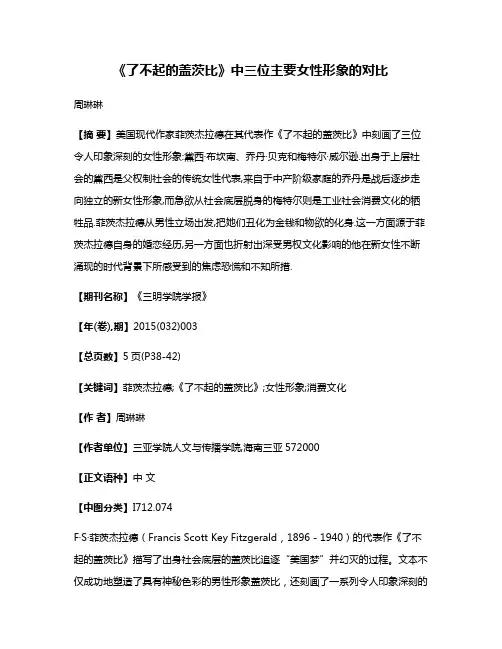
《了不起的盖茨比》中三位主要女性形象的对比周琳琳【摘要】美国现代作家菲茨杰拉德在其代表作《了不起的盖茨比》中刻画了三位令人印象深刻的女性形象:黛西·布坎南、乔丹·贝克和梅特尔·威尔逊.出身于上层社会的黛西是父权制社会的传统女性代表,来自于中产阶级家庭的乔丹是战后逐步走向独立的新女性形象,而急欲从社会底层脱身的梅特尔则是工业社会消费文化的牺牲品.菲茨杰拉德从男性立场出发,把她们丑化为金钱和物欲的化身.这一方面源于菲茨杰拉德自身的婚恋经历,另一方面也折射出深受男权文化影响的他在新女性不断涌现的时代背景下所感受到的焦虑恐慌和不知所措.【期刊名称】《三明学院学报》【年(卷),期】2015(032)003【总页数】5页(P38-42)【关键词】菲茨杰拉德;《了不起的盖茨比》;女性形象;消费文化【作者】周琳琳【作者单位】三亚学院人文与传播学院,海南三亚572000【正文语种】中文【中图分类】I712.074F·S·菲茨杰拉德(Francis Scott Key Fitzgerald,1896-1940)的代表作《了不起的盖茨比》描写了出身社会底层的盖茨比追逐“美国梦”并幻灭的过程。
文本不仅成功地塑造了具有神秘色彩的男性形象盖茨比,还刻画了一系列令人印象深刻的女性形象。
以往很多研究者受第一人称叙述者尼克的男性主义立场影响,认为文本中的三位主要女性——黛西·布坎南、乔丹·贝克和梅特尔·威尔逊沉醉于爵士时代纸醉金迷的生活,是金钱和物欲的化身。
但如果我们从女性主义视角研读作品,会发现这三位女性具有不同的形象和文化意义:黛西是父权制社会的传统女性代表,乔丹是战后逐步走向独立的新女性形象,梅特尔则是工业社会消费文化的牺牲品。
黛西是出身于上层社会的名门闺秀。
少女时期的黛西家,拥有漂亮豪华的住宅,令盖茨比惊奇不已,她“在路易斯维尔的姑娘中风头最足,尽人皆知......”[1](P65)也令乔丹暗自倾慕。
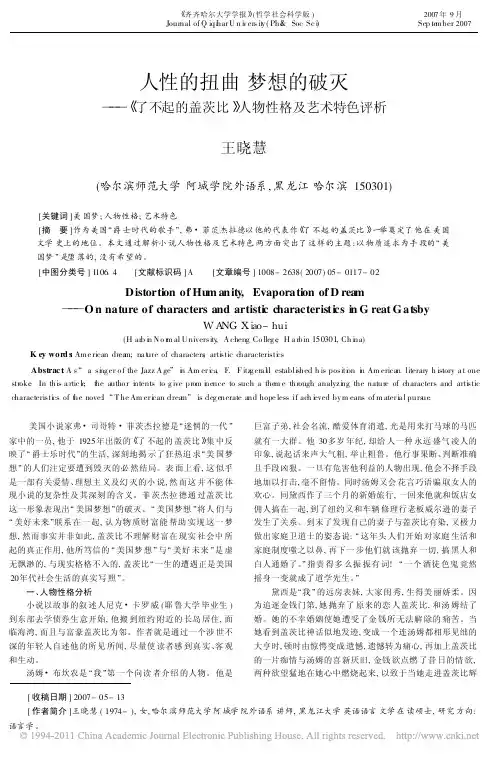
齐齐哈尔大学学报 (哲学社会科学版)2007年9月Journal of Q iqi har U n i v ers it y (Ph&i Soc Sc i )Sep te mber 2007[收稿日期]2007-05-13[作者简介]王晓慧(1974-),女,哈尔滨师范大学阿城学院外语系讲师,黑龙江大学英语语言文学在读硕士,研究方向:语言学。
人性的扭曲梦想的破灭!!! 了不起的盖茨比 人物性格及艺术特色评析王晓慧(哈尔滨师范大学阿城学院外语系,黑龙江哈尔滨150301)[关键词]美国梦;人物性格;艺术特色[摘 要]作为美国∀爵士时代的歌手#,弗∃菲茨杰拉德以他的代表作 了不起的盖茨比 一举奠定了他在美国文学史上的地位。
本文通过解析小说人物性格及艺术特色两方面突出了这样的主题:以物质追求为手段的∀美国梦#是堕落的,没有希望的。
[中图分类号]I106 4[文献标识码]A[文章编号]1008-2638(2007)05-0117-02Distortion of Hu m anity ,Evaporation of D rea m!!!O n nature of characters and artistic characteristics in G reat G atsbyW A NG X iao -hu i(H arb i n N o r m al U niversity ,A cheng Co lleg e ,H a rbin 150301,Ch i na)K ey word s:Ame rican drea m;na t ure of characters ;arti stic characteristi cs Abstrac t :A s ∀a si ng er o f the Jazz A ge #i n Am er i ca , F.F itz g era l d establi shed h is positi on i n Am erican literary h istory a t one stroke .In this a rtic l e ,t he autho r i ntents to g ive prom i nence to such a the m e through analyzi ng the nature of characters and arti sticcharacteristi cs of t he nove:l ∀T he Am er i can drea m #is deg enerate and hope less if ach i eved by m eans of m ater i a l purs ue .美国小说家弗∃司哥特∃菲茨杰拉德是∀迷惘的一代#家中的一员,他于1925年出版的 了不起的盖茨比 集中反映了∀爵士乐时代#的生活,深刻地揭示了狂热追求∀美国梦想#的人们注定要遭到毁灭的必然结局。
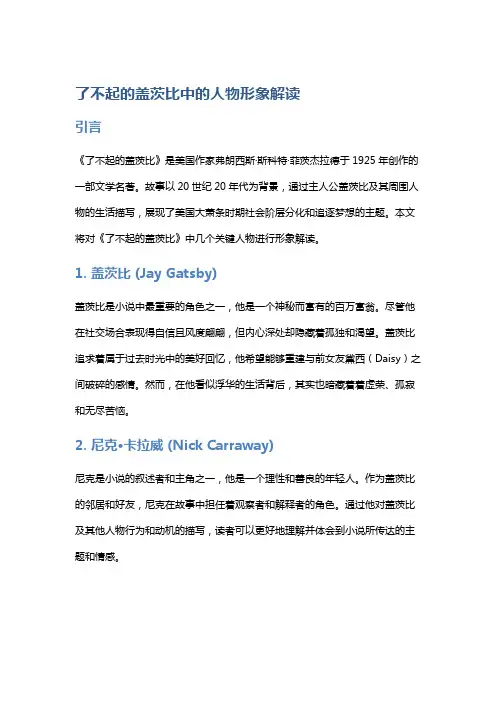
了不起的盖茨比中的人物形象解读引言《了不起的盖茨比》是美国作家弗朗西斯·斯科特·菲茨杰拉德于1925年创作的一部文学名著。
故事以20世纪20年代为背景,通过主人公盖茨比及其周围人物的生活描写,展现了美国大萧条时期社会阶层分化和追逐梦想的主题。
本文将对《了不起的盖茨比》中几个关键人物进行形象解读。
1. 盖茨比 (Jay Gatsby)盖茨比是小说中最重要的角色之一,他是一个神秘而富有的百万富翁。
尽管他在社交场合表现得自信且风度翩翩,但内心深处却隐藏着孤独和渴望。
盖茨比追求着属于过去时光中的美好回忆,他希望能够重建与前女友黛西(Daisy)之间破碎的感情。
然而,在他看似浮华的生活背后,其实也暗藏着着虚荣、孤寂和无尽苦恼。
2. 尼克·卡拉威 (Nick Carraway)尼克是小说的叙述者和主角之一,他是一个理性和善良的年轻人。
作为盖茨比的邻居和好友,尼克在故事中担任着观察者和解释者的角色。
通过他对盖茨比及其他人物行为和动机的描写,读者可以更好地理解并体会到小说所传达的主题和情感。
3. 黛西·布坎南 (Daisy Buchanan)黛西是小说中另一个核心角色,她是一个充满魅力却也深受虚荣心驱使的女人。
黛西与盖茨比曾有过一段恋情,然而出于社会地位和家庭压力选择了与当时的丈夫汤姆·布坎南(Tom Buchanan)结婚。
尽管如此,她内心深处仍然对盖茨比抱有情感,并最终造成了故事悲剧性的结局。
4. 汤姆·布坎南 (Tom Buchanan)汤姆是黛西的丈夫,一个富有且强势的男人。
他代表着那个时期上流社会男性所拥有的阶级优越感和保守观念。
汤姆对黛西不忠,同时也经常表现出种族主义和傲慢的态度。
汤姆的形象暴露了社会阶层之间的差距以及那个时期男性主导社会中存在的性别问题。
结论《了不起的盖茨比》通过对盖茨比及其他关键角色形象的描写,展示了奢华与虚荣、爱与背叛、社会光鲜背后的冷漠和空虚等主题。
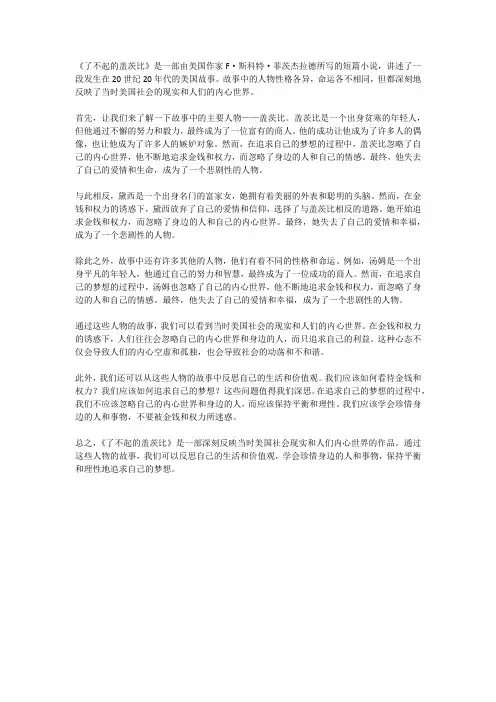
《了不起的盖茨比》是一部由美国作家F·斯科特·菲茨杰拉德所写的短篇小说,讲述了一段发生在20世纪20年代的美国故事。
故事中的人物性格各异,命运各不相同,但都深刻地反映了当时美国社会的现实和人们的内心世界。
首先,让我们来了解一下故事中的主要人物——盖茨比。
盖茨比是一个出身贫寒的年轻人,但他通过不懈的努力和毅力,最终成为了一位富有的商人。
他的成功让他成为了许多人的偶像,也让他成为了许多人的嫉妒对象。
然而,在追求自己的梦想的过程中,盖茨比忽略了自己的内心世界,他不断地追求金钱和权力,而忽略了身边的人和自己的情感。
最终,他失去了自己的爱情和生命,成为了一个悲剧性的人物。
与此相反,黛西是一个出身名门的富家女,她拥有着美丽的外表和聪明的头脑。
然而,在金钱和权力的诱惑下,黛西放弃了自己的爱情和信仰,选择了与盖茨比相反的道路。
她开始追求金钱和权力,而忽略了身边的人和自己的内心世界。
最终,她失去了自己的爱情和幸福,成为了一个悲剧性的人物。
除此之外,故事中还有许多其他的人物,他们有着不同的性格和命运。
例如,汤姆是一个出身平凡的年轻人,他通过自己的努力和智慧,最终成为了一位成功的商人。
然而,在追求自己的梦想的过程中,汤姆也忽略了自己的内心世界,他不断地追求金钱和权力,而忽略了身边的人和自己的情感。
最终,他失去了自己的爱情和幸福,成为了一个悲剧性的人物。
通过这些人物的故事,我们可以看到当时美国社会的现实和人们的内心世界。
在金钱和权力的诱惑下,人们往往会忽略自己的内心世界和身边的人,而只追求自己的利益。
这种心态不仅会导致人们的内心空虚和孤独,也会导致社会的动荡和不和谐。
此外,我们还可以从这些人物的故事中反思自己的生活和价值观。
我们应该如何看待金钱和权力?我们应该如何追求自己的梦想?这些问题值得我们深思。
在追求自己的梦想的过程中,我们不应该忽略自己的内心世界和身边的人,而应该保持平衡和理性。
我们应该学会珍惜身边的人和事物,不要被金钱和权力所迷惑。

请阐释《了不起的盖茨比》的主要内容和人物塑造的
特点
《了不起的盖茨比》主要讲述了主人公詹姆斯·卡兹本是一个贫穷的农家子弟,经过一番努力,他终于步步高升,并更名为杰伊·盖茨比。
他爱上了黛茜·费,可是当他归来时,黛茜已嫁作人妇。
盖茨买下了一幢豪华别墅,与他们隔海湾相望。
后来黛茜开车碾死了丈夫的情妇,汤姆嫁祸于盖茨比,盖茨比被害,黛茜居然没来送葬。
叙述者尼克由此看透了上层社会有钱人的冷酷残忍和居心险恶,离开纽约,回到了故乡。
黛西作为当时新潮女性的典型代表,也成为菲茨杰拉德在整部小说中重点描写的对象之一。
作者在小说中通过不同的方式生动地把黛西刻画为自私、情感冷漠、金钱至上的新潮女郎。
一方面,她希望能从中寻找庇护,另一方面却被婚姻和感情禁锢了自由。
这一点也正反映了新潮女郎所处的时代背景———从传统到现代过渡的20世纪20年代,对于在新旧夹缝中求生存的新派女郎来说,自由和独立是那样遥不可及。
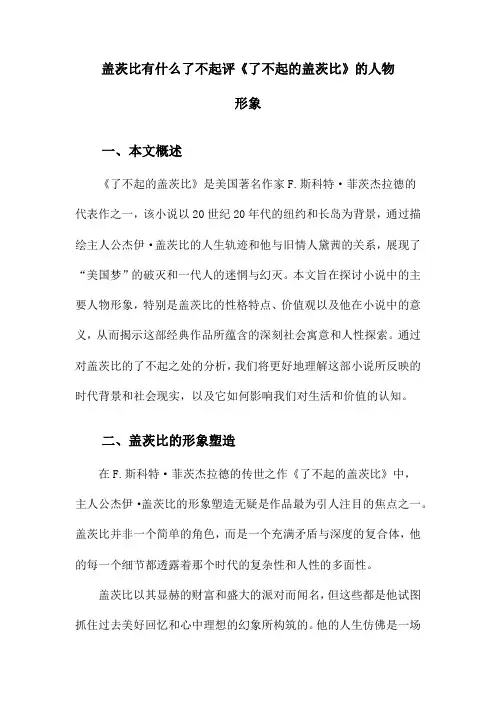
盖茨比有什么了不起评《了不起的盖茨比》的人物形象一、本文概述《了不起的盖茨比》是美国著名作家F.斯科特·菲茨杰拉德的代表作之一,该小说以20世纪20年代的纽约和长岛为背景,通过描绘主人公杰伊·盖茨比的人生轨迹和他与旧情人黛茜的关系,展现了“美国梦”的破灭和一代人的迷惘与幻灭。
本文旨在探讨小说中的主要人物形象,特别是盖茨比的性格特点、价值观以及他在小说中的意义,从而揭示这部经典作品所蕴含的深刻社会寓意和人性探索。
通过对盖茨比的了不起之处的分析,我们将更好地理解这部小说所反映的时代背景和社会现实,以及它如何影响我们对生活和价值的认知。
二、盖茨比的形象塑造在F.斯科特·菲茨杰拉德的传世之作《了不起的盖茨比》中,主人公杰伊·盖茨比的形象塑造无疑是作品最为引人注目的焦点之一。
盖茨比并非一个简单的角色,而是一个充满矛盾与深度的复合体,他的每一个细节都透露着那个时代的复杂性和人性的多面性。
盖茨比以其显赫的财富和盛大的派对而闻名,但这些都是他试图抓住过去美好回忆和心中理想的幻象所构筑的。
他的人生仿佛是一场盛大的幻觉,金碧辉煌的派对、豪华的住宅和无数宾客的欢声笑语,都是他试图重温旧梦的舞台。
然而,在这些华丽的外表下,隐藏的是盖茨比对黛西的深深眷恋和对过去时光的无法释怀。
盖茨比的形象塑造中,最为引人注目的是他对于“美国梦”的执着追求。
他相信通过个人的努力和不懈的奋斗,就能够实现自己的梦想,获得真正的幸福。
然而,在小说中,这个梦想最终证明是虚幻的,盖茨比的悲剧命运揭示了“美国梦”的脆弱和破灭。
他最终为了追求这个梦想而付出了生命的代价,成为了这个时代的牺牲品。
盖茨比的形象还体现在他对于人际关系的处理方式上。
他对朋友忠诚,对爱情执着,甚至愿意为了他人而牺牲自己。
然而,他的这种过度的付出和牺牲最终却导致了他的悲剧命运。
他对于黛西的爱恋让他陷入了无法自拔的境地,而他对于朋友尼克的无私帮助也让他卷入了一场本可以避免的灾难。
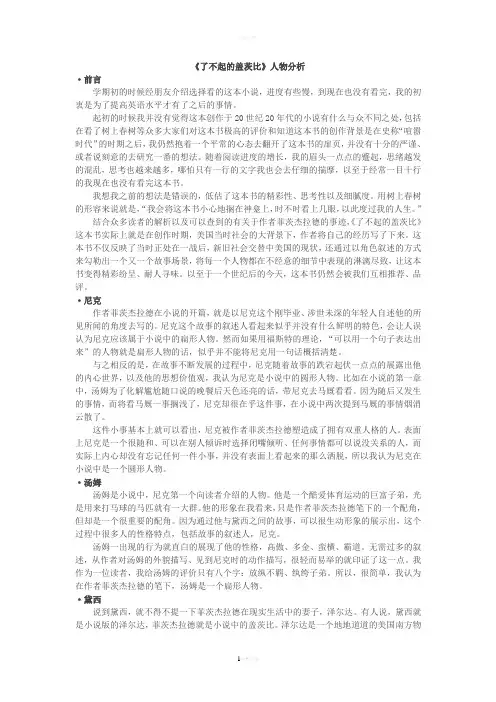
《了不起的盖茨比》人物分析·前言学期初的时候经朋友介绍选择看的这本小说,进度有些慢,到现在也没有看完,我的初衷是为了提高英语水平才有了之后的事情。
起初的时候我并没有觉得这本创作于20世纪20年代的小说有什么与众不同之处,包括在看了树上春树等众多大家们对这本书极高的评价和知道这本书的创作背景是在史称“喧嚣时代”的时期之后,我仍然抱着一个平常的心态去翻开了这本书的扉页,并没有十分的严谨、或者说刻意的去研究一番的想法。
随着阅读进度的增长,我的眉头一点点的蹙起,思绪越发的混乱,思考也越来越多,哪怕只有一行的文字我也会去仔细的揣摩,以至于经常一目十行的我现在也没有看完这本书。
我想我之前的想法是错误的,低估了这本书的精彩性、思考性以及细腻度。
用树上春树的形容来说就是,“我会将这本书小心地搁在神龛上,时不时看上几眼,以此度过我的人生。
”结合众多读者的解析以及可以查到的有关于作者菲茨杰拉德的事迹,《了不起的盖茨比》这本书实际上就是在创作时期,美国当时社会的大背景下,作者将自己的经历写了下来。
这本书不仅反映了当时正处在一战后,新旧社会交替中美国的现状,还通过以角色叙述的方式来勾勒出一个又一个故事场景,将每一个人物都在不经意的细节中表现的淋漓尽致,让这本书变得精彩纷呈、耐人寻味。
以至于一个世纪后的今天,这本书仍然会被我们互相推荐、品评。
·尼克作者菲茨杰拉德在小说的开篇,就是以尼克这个刚毕业、涉世未深的年轻人自述他的所见所闻的角度去写的。
尼克这个故事的叙述人看起来似乎并没有什么鲜明的特色,会让人误认为尼克应该属于小说中的扁形人物。
然而如果用福斯特的理论,“可以用一个句子表达出来”的人物就是扁形人物的话,似乎并不能将尼克用一句话概括清楚。
与之相反的是,在故事不断发展的过程中,尼克随着故事的跌宕起伏一点点的展露出他的内心世界,以及他的思想价值观,我认为尼克是小说中的圆形人物。
比如在小说的第一章中,汤姆为了化解尴尬随口说的晚餐后天色还亮的话,带尼克去马厩看看。
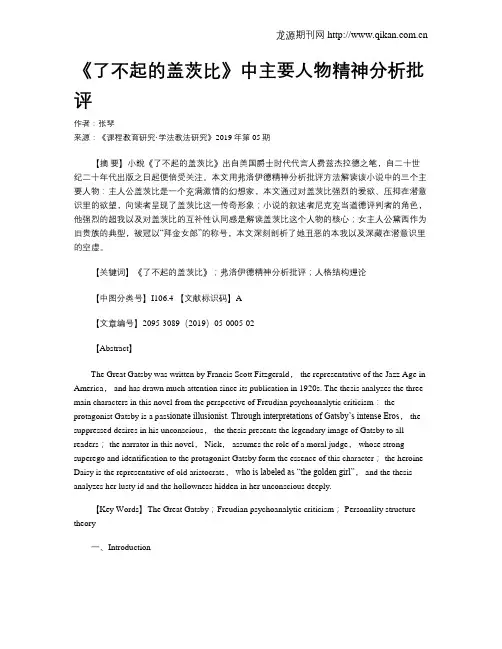
《了不起的盖茨比》中主要人物精神分析批评作者:张琴来源:《课程教育研究·学法教法研究》2019年第05期【摘要】小說《了不起的盖茨比》出自美国爵士时代代言人费兹杰拉德之笔,自二十世纪二十年代出版之日起便倍受关注。
本文用弗洛伊德精神分析批评方法解读该小说中的三个主要人物:主人公盖茨比是一个充满激情的幻想家,本文通过对盖茨比强烈的爱欲、压抑在潜意识里的欲望,向读者呈现了盖茨比这一传奇形象;小说的叙述者尼克充当道德评判者的角色,他强烈的超我以及对盖茨比的互补性认同感是解读盖茨比这个人物的核心;女主人公黛西作为旧贵族的典型,被冠以“拜金女郎”的称号,本文深刻剖析了她丑恶的本我以及深藏在潜意识里的空虚。
【关键词】《了不起的盖茨比》;弗洛伊德精神分析批评;人格结构理论【中图分类号】I106.4 【文献标识码】A【文章编号】2095-3089(2019)05-0005-02【Abstract】The Great Gatsby was written by Francis Scott Fitzgerald, the representative of the Jazz Age in America, and has drawn much attention since its publication in 1920s. The thesis analyzes the three main characters in this novel from the perspective of Freudian psychoanalytic criticism: the protagonist Gatsby is a pas sionate illusionist. Through interpretations of Gatsby’s intense Eros, the suppressed desires in his unconscious, the thesis presents the legendary image of Gatsby to all readers; the narrator in this novel, Nick, assumes the role of a moral judge, whose strong superego and identification to the protagonist Gatsby form the essence of this character; the heroine Daisy is the representative of old aristocrats,who is labeled as “the golden girl”, and the thesis analyzes her lusty id and the hollowness hidden in her unconscious deeply.【Key Words】The Great Gatsby;Freudian psychoanalytic criticism; Personality structure theory一、IntroductionFrancis Scott Key Fitzgerald, one of the most famous American writers in the 20th century and the author of the Great Gatsby, was born in 1896 in St. Paul, Minnesota. Twenties was Fitzgerald’s exclusive decade, as his works swept across America and Europe. His masterpiece,the Great Gatsby, was published in 1925,when America’s economy was booming in t his decade,with crime, alcohol and fast cars on rise. It was an era of chaos and ceaseless jazz music, which was called “Jazz Age” by Fitzgerald. The story in the Great Gatsby was set in this historical background.This thesis is an exploration of main characters in the Great Gatsby based on the established Freudian psychoanalytic criticism. The employment of Freud’s psychoanalytic criticism essential when composing this thesis, especially when analyzing the three main characters,Gatsby, Nick,and Daisy, under the influence of the division of id, ego, and superego.二、Sigmund Freud’s Psychoanalytic CriticismSigmund Freud (1856-1939) is an Austrian physician and the founder of psychoanalysis.The publication of Freud’s Interpretation o f Dreams in 1900 first made him well-known around the world and his discovery of the unconscious was epochal, which revolutionized the way people reexamine themselves.In 1905, his hypothesis that all human activities were driven by sexual desires shocked the whole society in the West,which revolutionized people’s thoughts once again.Freud proposed that the human psyche could be divided into three parts: Id, Ego and Superego. Id is the reservoir of desires, impetus required for survival, which is totally driven by unconscious. Ego is that part of human psyche which acts and responds to the surrounding world in a way as “self” or “I”, whose goal is to repress the undesirable instinctual impulses and try to be moral, ensuring that most desires or needs are met in accordance with the reality principle. The last part of human psyche is superego,which is driven by people’s conscience, following the rules and standards for good behaviors. According to Freud’s theory, superego opposes the id and desires which are originated from it by enforcing moral restrictions and trying to reach the goal of achieving ideal perfection.三、Jay Gatsby: The Passionate IllusionistGatsby, legally James Gatz, was born in a peasant family in the middle-west. When Gatsby served in World War I, he became a lieutenant and fell in love with Daisy, who came from an upper-class family and later deserted him because of his shabby social status and then married a wealthy man Tom. All this provoked Gatsby’s determination to become rich.Through bootlegging he realized his dream, bought a mansion on West Egg, throwing extravagant party every night only to attract Daisy’s attention from across the bay.1.Gatsby’s Intense Eros.One of Freud’s important theories deals with the relationship between the id and libido. The id is the only reservoir of libido, which is also called sexual instinct triggered by Eros. In the case of Gatsby’s libido,which was suppressed by the fact that he couldn’t get Daisy, it was relieved in various means, such as relentless pursuing for money, reputation, and social status, together with his lavish parties which help him won people’s admiration and jealousy.Gatsby left readers with an impression of being persistent and passionate, as Eros has the capability to encourage people to fight for themselves and meet the needs of the id, through the exploration of Gatsby’s rising from scratch, his persistence and passion for his future glory was definitely derived from his Eros.After Daisy attended Gatsby’s party for the first time, as the representative of the old aristocrats, she threw her contempt and disregards on the newly-rich group. Even Gatsby sensed the unwillingness of Daisy to leave Tom, he was obstinate that he could alter the fact and change Daisy’s decision. In a word,Gatsby’s Eros in this story was vibrant and persistent, which spurred him to achieve his goal and satisfy his id to the most extent.2.Suppressed Desires in Unconscious.Although Gatsby started from scratch and he realized his American dream, underneath the facade of wealth and power, Gatsby was definitely a negative byproduct of American dream. All along Gatsby’s life journey, he experienced breakthroughs as well as struggles. Thankfully, he didn’t give in and eventually he was but one short step to his dream. In this process of struggling,Gatsby repressed most of his desires preserved in his unconscious. All of his desires and conflicts are below the level of conscious as his lust and aggression surfaced from unconscious, therefore at this critical moment, his id was the determining factor to his behaviors. For instance, in spite of bootlegging was illegal and banned by explicit order in 1920s, Gatsby still risked reaping huge profits to meet these needs of the id which were used to be unrealistic even impossible to him.In a word, the lust and aggression deep in his id drove him to do what he had never done only in order to win over the beauty’s heart.四、Nick Carraway: The Honest MoralistAs the narrator of this novel, Nick Carraway was equipped with the ability to survey all characters involved and document their experiences in the summer of 1922. When it comes to Nick’s omniscience, his special relations with other characters are necessary to be mentioned here first.1.Nick’s Strong Superego.In the whole story,Nick was equipped with the right to judge all characters’ behavior, not only owning to his special relationship with all others, but also his strong superego, which guidedhim to judge fairly and disdain the fickleness of the world. Nick’s father once told him that all the people in this world haven’t had the advantages that he has had. Obviously, Fitzgerald attached a sense of moral superiority on Nick, endowing Nick to play the special role of a judge and moralist.The most distinct disdain and disgust that Nick had toward the crowd of old aristocracy was his contempt for Tom and Daisy. Although Nick was once attracted by the gay and prominent life in New York City and strived for his American dream, after witnessing what happened to people around,he decided to flinch.The withdrawal of Nick when facing the prosperity of metropolitan life implied his consciousness of his surroundings and his moral clarity after experiencing much in this dirty and foul society.The ideal that Fitzgerald wanted to achieve was a character, Nick, who possessed strong superego in the author’s literary work and did what he hadn’t done in real life.2.Identification to Gatsby.Identification, from the perspective of psychoanalysis, is the process in which the ego tries to emulate another.For example, if a boy identifies himself with his father, he wants to be like his father.Nick’s attitude toward Gatsby wasn’t identification from the very beginning, as his comment on Gatsby at first was“Gatsby represented everything for which I have an unaffected scorn (6)”. However, in the last chapter,when Nick left Gatsby’s mansion and he found himself being responsible to tell his true feelings toward Gatsby,which was transformed to “They’re a rotten crowd… You’re worth the whole damn bunch put together (150)”. Then Nick’s attitude toward Gatsby completed its transformation from disdain to identification.In this novel Nick is the witness of Gatsby’s extravagant lifestyle and his desolate funeral,which makes the relationship between them quite subtle. They had much in common when it comes to their encounters.The loyalty and unconditional help that Nick provided to Gatsby serves as a proof of his identification to Gatsby. Nick regarded Gatsby as another half, which helps him to reach a psychological satisfaction and balance.五、Daisy Buchanan:“The Golden Girl”Daisy Buchanan playe d an important role in causing Gatsby’s tragedy, and she embodied the features of hedonism of America in 1920s, which was named as the Jazz Age by Fitzgerald. Hedonism seeks for infinite pleasure and enjoyment,which matches with the principle of human’s id, the pleasure principle.1.Daisy’s Lusty Id.As other young girls, Daisy sought for romantic love; however, what she asked for extra was that the romance needed to be built on wealth and high social status. In one of the conversations between Nick and Gatsby, where they were commenting on Daisy, Nick thought Daisy got an indiscreet voice and Gatsby added that her voice was full of money, who talked to the point of this discourse. Daisy’s criterion for love was shallow and snobbish, which was mainly guided by her id, as she made decisions of her life solely based on the pleasure principle.At the climax in this novel,Daisy rode in Gatsby’s car and ran Myrtle over in panic. She didn’t intend to confess the guilty and conspired with Tom to run away, leaving Gatsby to be in danger and then get killed by Myrtle’s husband. Their ruthlessness and indifference in the novel showed the characteristics of the group of upper-class people who were represented by Tom and Daisy, which was also criticized and despised by the author in the real life.2.Hollowness Hidden in Unconscious.In this novel,Fitzgerald paid special attention not only to Daisy’s diction but also the adjectives to describe her. The most frequently used adjectiv e to describe Daisy was “white”, for instance,she wore in white, rode in white and lived in a white palace. Generally speaking, the adjective “white” is used to describe someone pure and graceful, however, in my perspective, the author meant to show the h ollowness and emptiness hidden in Daisy’s unconscious.To explore deeply into Daisy’s words, her psychological status and hollowness hidden in unconscious surfaced from her discourses. In the hottest day in the summer of 1922, all major characters gathered in Daisy’s house. Then Daisy said,“What’ll we do with ourselves this afternoon? And the day after that, and the next thirty years?(116)”these three questions in arow constitute to Daisy’s bewilderment and fickleness. As they had no worries about money, all they had to worry about was how to kill time while others struggled in the abyss of suffering.六、ConclusionThe thesis attempts to present a detailed study of three main characters in the novel The Great Gatsby in view of Sigmund Freud’s psychoanalytic criticism.The analysis of characters from the perspective of psychoanalytic criticism reminds us of the importance of personality and psychological condition to people. Psychoanalysis helps us to see the real relationship among people and catch the point in the social intercourse. A quick review of the whole thesis makes us reflect on Gatsby’s tragedy,which was also that era’s tragedy. However, it also gives hope to the reader as people like Nick who insists on his moral standards would judge the society with justice and compassion.References[1]陳晨.2009.黛西的矛盾——《了不起的盖茨比》中女主人公形象再析[J].山花(6):139-140.[2]朱建廷. 2005.《了不起的盖茨比》的“精神分析”阐释 [D].M.A Thesis.保定:华北电力大学.[3]Fitzgerald, Francis S. 2011.The Great Gatsby[M].Beijing: Foreign Languages Press.[4]Freud, Sigmund. 1993. Beyond the Pleasure Principle[J].New York: W.W.Norton & Company.。
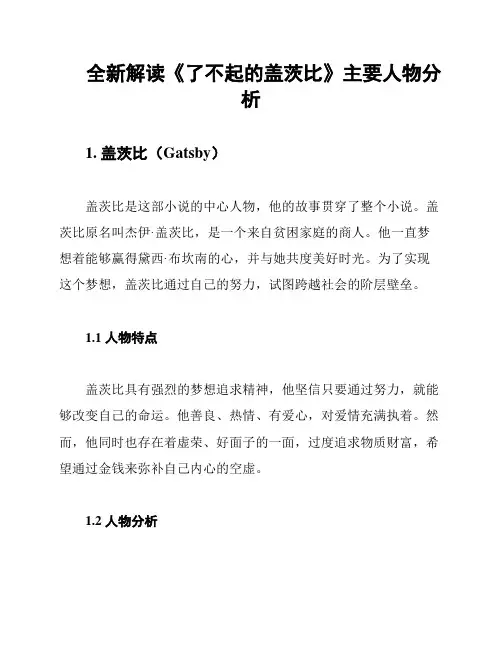
全新解读《了不起的盖茨比》主要人物分析1. 盖茨比(Gatsby)盖茨比是这部小说的中心人物,他的故事贯穿了整个小说。
盖茨比原名叫杰伊·盖茨比,是一个来自贫困家庭的商人。
他一直梦想着能够赢得黛西·布坎南的心,并与她共度美好时光。
为了实现这个梦想,盖茨比通过自己的努力,试图跨越社会的阶层壁垒。
1.1 人物特点盖茨比具有强烈的梦想追求精神,他坚信只要通过努力,就能够改变自己的命运。
他善良、热情、有爱心,对爱情充满执着。
然而,他同时也存在着虚荣、好面子的一面,过度追求物质财富,希望通过金钱来弥补自己内心的空虚。
1.2 人物分析盖茨比的一生可以用“梦想”和“悲剧”来形容。
他的梦想推动着他不断努力,然而现实却残酷地击碎了他的梦想。
他的悲剧在于,他始终没有认识到金钱并不能买到真正的爱情。
盖茨比的命运反映了美国梦的虚幻性和幻灭,揭示了社会阶层壁垒的难以跨越。
2. 黛西·布坎南(Daisy Buchanan)黛西是盖茨比心中永恒的梦中情人,一个美丽、优雅、富有魅力的女性。
然而,她也是一个自私、虚荣、缺乏责任感的女性。
她在盖茨比和汤姆·布坎南之间摇摆不定,最终选择回到了汤姆的身边。
2.1 人物特点黛西是一个典型的上层社会女性,她外表美丽,性格迷人,但内心却充满了虚荣和自私。
她对待盖茨比和汤姆的态度,揭示了她在道德和情感上的矛盾。
2.2 人物分析黛西在小说中扮演了一个重要的角色,她的选择和行为对盖茨比的命运产生了深远的影响。
她的形象反映了当时美国上层社会的虚伪和腐败,揭示了女性在社会压力下的无奈和挣扎。
3. 尼克·卡拉威(Nick Carraway)尼克是盖茨比和黛西故事的主要叙述者,他是一个来自中西部的年轻证券经纪人。
在小说的结尾,尼克完成了从旁观者到参与者再到旁观者的转变。
3.1 人物特点尼克具有诚实、善良的品质,他对身边的人和事持有自己的见解。
他既参与了盖茨比和黛西的故事,又始终保持一定的距离,以旁观者的身份见证了整个事件的经过。
《了不起的盖茨比》中三位主要女性形象的对比《了不起的盖茨比》是导演史蒂文·斯皮尔伯格经典的一部电影,讲述的是勇敢的少年盖茨比的成长历程。
在这部影片中,出现了三个主要的女性形象,它们是玛格丽特·格蕾斯韦尔(Daisy Buchanan)、安吉拉·贝尔(Jordan Baker)和大英雄伊迪丝·詹姆斯(Edith James)。
这三个女性分别代表着不同的价值观、思想和行为,对片中故事及盖茨比的成长有着重要的影响。
玛格丽特·格蕾斯韦尔是片中的女主角,是一位绝色的社交精英女士,在她的手中握有着大量的财富。
她要求完美,渴望被爱和被欣赏,而她的个性温柔、贴心的做法也赢得了盖茨比的喜爱。
但是,她却拒绝感情上的、精神上的表现,而是对金钱生活的追求,这也是她最后被盖茨比遗弃的原因。
安吉拉·贝尔是一位高贵的女士,她是一位有着自己价值观的人。
她有自己独特的审美观,并带给盖茨比一些新的观念,让他学会独立思考,从而实现自己的梦想。
她也把自己的理想灌输给盖茨比,鼓励他追求自由、寻找真正的爱。
大英雄伊迪丝·詹姆斯是一位性格坚强、勇敢无畏的女士,她是一位拥有自由、热情和慷慨的女性。
她坚持自己的信念,帮助盖茨比改变,从而实现自己的梦想。
他激励盖茨比勇敢前行,相信自己,从而获得了盖茨比最终成功的结果。
从这三个女性形象中,我们可以看到,绝色的社交精英女士玛格丽特·格蕾斯韦尔的价值观是有错误的,她只追求金钱,忽视了感情和精神的要求,这也是她最终失败的原因。
安吉拉·贝尔的价值观则更加实际,她拥有自己的审美观,能够给盖茨比带来新的观念,从而更好地发展自己。
而大英雄伊迪丝·詹姆斯的价值观则是最正确的,她拥有自由、勇敢、热情和慷慨,他帮助盖茨比改变,并鼓励他坚持自己的梦想,这也是他成功的原因。
在《了不起的盖茨比》中,玛格丽特·格蕾斯韦尔、安吉拉·贝尔和大英雄伊迪丝·詹姆斯三位主要女性形象代表着不同的价值观,而它们也对片中故事及盖茨比的成长有着重要的影响。
了不起的盖茨比小说了不起的盖茨比小说中的人物分析0【导读】《了不起的盖茨比》是美国作家弗·司各特·菲茨杰拉德1925年所写的一部以20世纪20年代的纽约市及长岛为背景的中篇小说,了不起的盖茨比小说中的人物分析主要包括浮华美梦的幻想者盖茨比、梦幻破灭的见证者尼克、物质世界的牺牲者黛西。
《了不起的盖茨比》是美国作家弗·司各特·菲茨杰拉德1925年所写的一部以20世纪20年代的纽约市及长岛为背景的中篇小说。
今天我们就来聊一聊了不起的盖茨比小说中的人物分析吧!一、盖茨比——浮华美梦的幻想者小说《了不起的盖茨比》原本讲述的就是一个基于幻想与现实的故事。
作为美国文学史上一个符号性人物,盖茨比穷尽一生都没有得到他所期待的爱情,在作者看来,盖茨比的存在都只是一个虚伪的梦,他自始至终都活在自己的想像的那个虚幻的世界。
小说中奢华糜烂的生活和虚伪空洞的人性形成了鲜明的对比,而盖茨比的伟大之处在于,他无论贫穷还是富有,始终保持着一颗纯洁的爱情之心,这一点在那种贪婪浮华的时代背景映衬下弥足珍贵。
但可悲的是,盖茨比的爱终究是自己编织出来的美好幻想,一个虚幻的梦。
盖茨比在生命的最后时刻仍呼唤着爱人的名字,显然在盖茨比的世界里,他依然保持着对于爱情的一份美好幻想与希望。
从整个故事发展的情景我们不难看出,除了金玉其外,败絮其中的时代环境是造就其悲剧的原因,盖茨比自身也蕴藏着矛盾而脆弱的悲剧性特质。
二、尼克----梦幻破灭的见证者影片中的另一个主要人物尼克是一个默默无名的小作家,作为“美国梦”的又一代表,他见证了盖茨比梦幻破灭的全过程。
这个由美国西部来到东部,最后又回到西部的年轻人,在这个纸醉金迷的浮华社会,目睹了太多的谎言与虚伪,肮脏不堪、污浊不清以及虚无缥缈的爱情,可以说他对这个世界备感厌恶失望。
对他而言写作是唯一最好的一种倾诉,于是他付诸到纸上,将他知道的一切有关盖茨比的故事写了下来。
文学伦理学批评是目前跻身世界文学评论方法中唯一一种由中国学者原创性提出的文学批评理论。
这种具有中国话语权的批评方法得到了世界文学批评界的认可。
[1]作为文学伦理学批评方法的创始人,聂珍钊教授为此进行了艰辛的探索并付出了巨大的努力,为我国文学批评方法走向世界作出了卓越的贡献。
[2]文学伦理学认为分析、阐释、解读文学作品应从伦理视角出发,结合文本所处的特定历史阶段的伦理环境[3],运用斯芬克斯因子论对作品中伦理冲突、伦理禁忌、理论秩序、伦理选择等进行研析与诠释。
斯芬克斯因子论是文学伦理学用来分析文学作品的主要工具理论。
它将人本身的属性分为兽性因子和人性因子,兽性因子是人从动物进化而来时所存留在人身上的原始属性,它的核心表现是人的自由意志。
自由意志作为兽性因子的意志体现会驱动人实施随心所欲的原始本能行为。
人性因子是人后天习得的、区别于动物的属性。
它的核心意志表现体现在两个方面,一是理性意志,二是非理性意志。
理性意志会驱动人们做出符合道德规范和伦理秩序的行为,是一种正能量意志行为。
非理性意志会驱动人们做出※收稿日期:2019-08-27作者简介:方明(1981-),男,山东潍坊人。
讲师,主要从事英美文学、英语教学研究。
摘要:《了不起的盖茨比》是著名美国小说家菲茨杰拉德的代表之作,出版以来享誉世界。
国内外对于这部作品的研究多集中于译介、美国梦和美国精神、叙事学、心理学、语言学等方向。
随着我国原创文学批评理论———文学伦理学的问世,其给《了不起的盖茨比》这一巨著带来了新的研究契机和研究视角。
从文学伦理学视角出发,结合作品的伦理环境,采用斯芬克斯因子论阐释《了不起的盖茨比》中所表现的伦理冲突、伦理困境和伦理选择,能够进一步深化对作品主要人物特征的认识,发掘出作品的伦理价值,展现文学作品的教化功能,对深化菲茨杰拉德小说研究具有积极的推进意义。
关键词:菲茨杰拉德;《了不起的盖茨比》;文学伦理学中图分类号:I712.074文献标志码:A文章编号:2095-9699(2019)05-0047-06方明(三明学院海外学院,福建三明365004)文学伦理学视角下《了不起的盖茨比》中主要人物形象分析非道德的、违背伦理秩序的行为,是一种负能量意志行为。
《了不起的盖茨比》中的汤姆形象分析摘要:《了不起的盖茨比》是菲茨杰拉德的代表作品之一,盖茨比与汤姆?布坎南是小说中的两大主人公。
盖茨比作为小说的主人公备受关注是毋庸置疑的,但是汤姆?布坎南作为另一个不可忽视的重要成员,前人对他的研究却少之又少。
菲茨杰拉德曾经说过,在《了不起的盖茨比》这部作品中,汤姆?布坎南是他认为人物塑造中最成功的一位。
本文主要分析了《了不起的盖茨比》汤姆?布坎南的人物形象。
关键词:《了不起的盖茨比》汤姆?布坎南形象《了不起的盖茨比》是F?S?菲茨杰拉德的代表作品之一,盖茨比与汤姆?布坎南作为小说中的两大主人公,在故事情节的发展与叙述中发挥着不可忽视的重要作用。
小说通过小职员尼克的亲眼目睹,为我们讲述了白手起家的富翁盖茨比为了追求自己的初恋情人黛西,最终自我牺牲的故事。
作为一部备受读者关注的文学作品,人们对作品的研究更是涵括了多个方面:无论是象征主义的运用、浪漫坚贞的爱情,还是美国梦的破灭、叙事手法的多样等等,都为我们进一步品读作品提供了帮助。
盖茨比作为小说的主人公备受关注是毋庸置疑的,但是汤姆?布坎南作为另一个不可忽视的重要成员,前人对他的研究却少之又少。
菲茨杰拉德曾经说过,在《了不起的盖茨比》这部作品中,汤姆?布坎南是他认为人物塑造中最成功的一位,同时汤姆?布坎南的出现无疑是作者对上层阶级最猛烈、尖锐的攻击与讽刺。
小说中盖茨比与汤姆?布坎南的出现就像天生的对立者,两个人相互对立,截然不同。
与盖茨比的出身卑微、白手起家相比,汤姆?布坎南则是在没有任何阻碍的情况下继承了丰厚的遗产,成为了家世富有的百万富翁;当盖茨比被所谓的社会地位无情践踏的时候,富足的资产却早已为汤姆?布坎南带来了所需的名望、尊严、社会地位;当盖茨比不断充实打造全新自己的时候,汤姆?布坎南却早已颓废于灯红酒绿的上层阶层中;小说《了不起的盖茨比》曾被称之为是一部“金钱的浪漫史”,金钱对社会的摧残、对人性的腐蚀,腐败、堕落无疑成为小说创作的核心。
《了不起的盖茨比》小说与电影人物形象之比较作者:王山佳美来源:《散文百家·下旬刊》2018年第10期摘要:《了不起的盖茨比》是美国作家菲茨杰拉德的小说,由巴兹·鲁赫曼导演执导改编并于2013年在美国上映。
影片较小说有较大改动,评价两极分化。
影片中无论是主人公盖茨比和黛西,还是关键人物汤姆和尼克,人物形象与原著都存在许多差异,从中可以体现出导演与原作者理念的不同。
关键词:《了不起的盖茨比》;电影;小说;人物形象;异同菲茨杰拉德被誉为美国20世纪爵士时代的“桂冠诗人”和“编年史家”,其代表作《了不起的盖茨比》在美国享誉盛名,是美国高中生必看的经典文学作品。
如此万众期待的经典,于2013年经导演巴兹·鲁赫曼执导改编后在全球上映并引发热议。
有的评论者认为,鲁赫曼很好地把握了原著的内容、描述和大部分的对话;《了不起的盖茨比》是一部令人沉醉的电影,观影过程中摄影完美,音响效果佳;有的评论者则认为“导演塑造了浓艳长格式音乐视频(所有千变万化的奇观镜头下很少有实质内涵)而非美国文学经典焕然一新的呈现”。
另外,原著粉对于导演的创造性阐释感到不满,认为其“除了美轮美奂的美术幕景、时髦的配乐和摄影手法外,原著的主题精神已经荡然无存”。
在主要人物盖茨比、黛西、汤姆的塑造上,电影的改编也和原著小说存在诸多差异,本文以故事的四个主人公为研究对象,对其在小说和电影中展现形象的不同加以阐释。
一、孤勇与理智——盖茨比盖茨比是这部小说《了不起的盖茨比》中的主人公,在小说中他是一个无论貧穷还是富有,都那么一心一意的执着、努力,为了实现他的梦想,为了得到他梦中的女神黛西而不懈奋斗的人。
但可悲的是,盖茨比爱的并非黛西本身,而是他幻想出来的完美的黛西,一个触不可及又注定会破灭的梦。
这是书和电影的相同之处。
对于盖茨比来说,戴西的意义远远超越了一个恋人,她是盖茨比的梦想,在某种程度上象征着他建构新的社会身份,取得上流社会的认同。